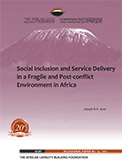
The post-colonial state in Africa has attracted great interest from scholars and development partners because of the recognition that no development can take place without a proper functioning state. The state is expected to provide and deliver goods and services to its citizens in order to promote its legitimacy before its citizens. However, in fragile or post-conflict states, the capacity of the state to deliver services to all citizens is not possible because of weak infrastructure, weak public service delivery and weak state institutions which lack the capacity to deliver service and thereby become illegitimate. This has led to the increasing recognition that service delivery interventions or initiatives in fragile states should aim to ameliorate the negative effects of social exclusion of marginalized and vulnerable groups. Against this backdrop, this paper discusses how social inclusion can be promoted and improved by service delivery in fragile states in Africa in the light of the fact that their different contextual variables (such as history, politics, culture and geographical location) affect their ability to develop their capacity to deliver services to their citizens. In other words, why is social exclusion in service delivery in fragile states challenging and what are the reasons for it? The paper shows that a combination of the inability of fragile states to perform their governance functions as a result of their peculiar circumstances and the adoption of the “one-size-fits-all” strategies to deliver services have largely contributed to social exclusion in service delivery. It ends with some policy recommendations.





